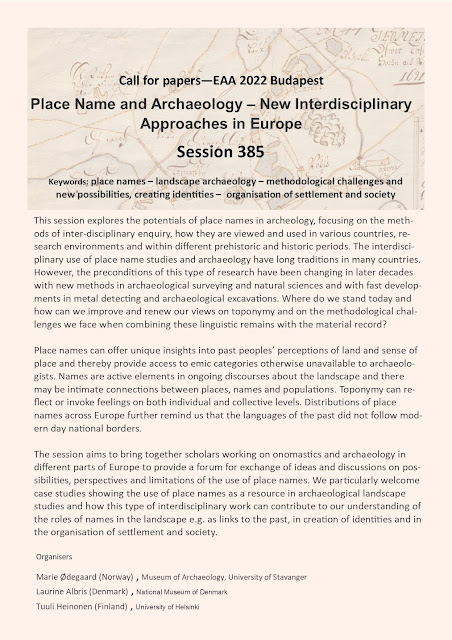28th EAA Annual Meeting in Budapest, Hungary, 31 August - 3 September 2022
Content:This session explores the potentials of place names in archeology, focusing on the methods of inter-disciplinary enquiry, how they are viewed and used in various countries, research environments and within different prehistoric and historic periods. The interdisciplinary use of place name studies and archaeology have long traditions in many countries. However, the preconditions of this type of research have been changing in later decades with new methods in archaeological surveying and natural sciences and with fast developments in metal detecting and archaeological excavations. Where do we stand today and how can we improve and renew our views on toponymy and on the methodological challenges we face when combining these linguistic remains with the material record?
Place names can offer unique insights into past peoples’ perceptions of land and sense of place and thereby provide access to emic categories otherwise unavailable to archaeologists. Names are active elements in ongoing discourses about the landscape and there may be intimate connections between places, names and populations. Toponymy can reflect or invoke feelings on both individual and collective levels. Distributions of place names across Europe further remind us that the languages of the past did not follow modern day national borders.
The session aims to bring together scholars working on onomastics and archaeology in different parts of Europe to provide a forum for exchange of ideas and discussions on possibilities, perspectives and limitations of the use of place names. We particularly welcome case studies showing the use of place names as a resource in archaeological landscape studies and how this type of interdisciplinary work can contribute to our understanding of the roles of names in the landscape e.g. as links to the past, in creation of identities and in the organisation of settlement and society.Keywords:place names, landscape archaeology, methodological challenges and new possibilities, creating identities, organisation of settlement and society
Call for contributions ends on Thursday 10 February 2022, 23:59 CET. After this date the session organisers and the Scientific Committee will evaluate all contributions and sessions and decide whether the contribution is accepted, rejected, recommended for revision or suggested for different session then submitted to. Following the evaluation by both session organisers and the Scientific Committee, the EAA Secretariat will announce accepted contributions before 24 March 2022. Presenters (first authors) then need to settle both payment of membership and conference registration fee before 21 April 2022, in order to have the contribution added to the scientific programme of the Annual Meeting. Once the unpaid authors are removed from the programme they will not be added back - no exceptions possible.
The session aims to bring together scholars working on onomastics and archaeology in different parts of Europe to provide a forum for exchange of ideas and discussions on possibilities, perspectives and limitations of the use of place names. We particularly welcome case studies showing the use of place names as a resource in archaeological landscape studies and how this type of interdisciplinary work can contribute to our understanding of the roles of names in the landscape e.g. as links to the past, in creation of identities and in the organisation of settlement and society.






















